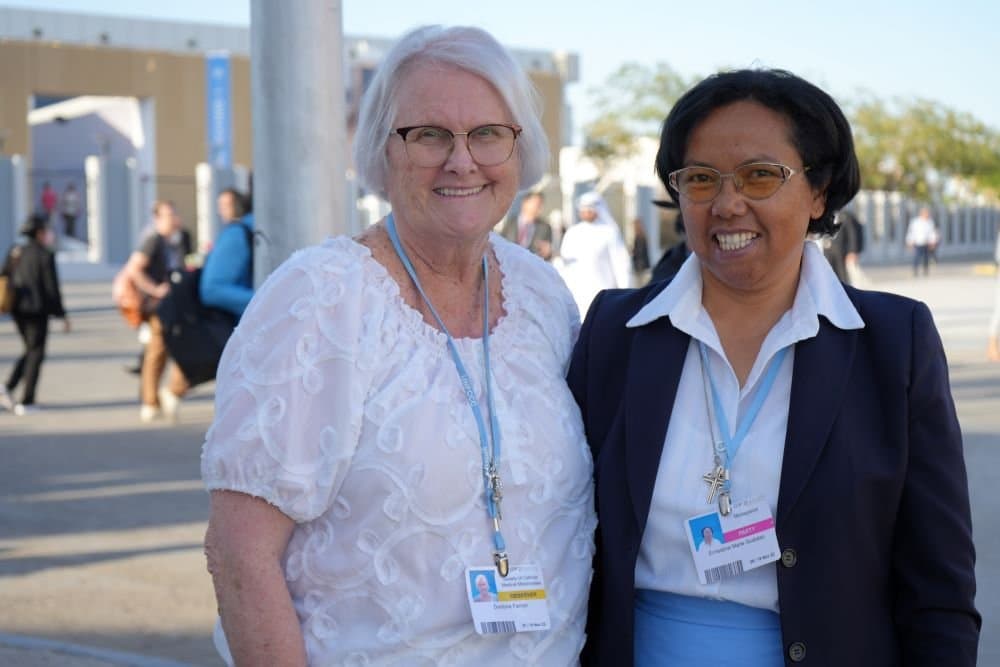SHARM EL-SHEIKH, Egypt — As the U.N. climate conference drew to a close, the European Union proposed a potential solution to the ongoing issue of a loss and damage fund, in which some countries would compensate nations most damaged by climate change.
The EU proposal, put forth Nov. 18, on what was scheduled as the last day of the conference, suggested that such a fund be from a “broad donor base.” The British news agency Reuters reported that could mean high-polluting emerging economies like China would have to contribute to the fund, rather than just rich nations that have historically contributed the most to global warming. Reuters added that deals at U.N. climate talks must be made with support from all of the nearly 200 countries involved.
Catholic sisters were among thousands of activists pushing for world leaders to commit to reducing emissions and finance loss and damages resulting from climate change to the Global South.
“Let’s act now or never. We don’t need any more talks because we know the situation,” said Sister Durstyne Farnan, an Adrian Dominican sister from Michigan. “World leaders must quickly agree on ways of fighting climate change to save the planet from damage,” she said, noting that it’s going to be important for “wealthier countries like the United States” to “find a way to work with other partners in the world, especially small islands that are being washed up and washed away.”
Farnan, who has been participating in street demonstrations at COP27, said it was unfair for wealthy nations to fail to implement climate mitigation funds while funding fossil fuel companies.
“We have a responsibility as religious to speak and at least be present at the events of COP27. We have many of our sisters in the Global South, and they have already told us what’s happening to their land — there is drought and floods, and people have lost livelihoods due to climate change,” she told EarthBeat, the environmental project of the U.S.-based National Catholic reporter.
Comboni Missionary Sister Paola Moggi, whose congregation has a significant presence in 16 African nations, said she was perplexed that the inclusion of loss and damage in the COP27 agenda remains a “hot issue” and “political game” that developed countries are not willing to discuss.
“What I see is that negotiations are very difficult here, and the progress is very slow because interests, especially financial interests, prevail,” said Moggi, representing VIVAT International, a faith-based organization working to bring the voice of grassroots communities to the U.N. “The special focus on finance and the debate on the loss and damage of financial facilities can be addressed not only from the material point of view but also from an immaterial point of view — cultural and spiritual damages need to be considered.”
Sister Ernestine Lalao, representing her congregation of Our Lady of Charity of the Good Shepherd from Madagascar, pleaded with wealthy nations responsible for the climate crisis to sympathize with those in developing countries who are excessively affected by climate injustices, and to agree to compensate them.
She said Madagascar is one of the countries in the world most affected by human-induced climate change, although it produces few greenhouse gas emissions. She said the country had experienced famine, cyclones, forced displacement, and loss of lives and livelihood due to the impact of climate change.
According to the CDP, a not-for-profit charity that runs the global disclosure system for management of environmental impacts, Africa produces less than 4 percent of global greenhouse gas emissions. In contrast, the report indicates that China is responsible for 23 percent, the U.S. for 19 percent and the European Union for 13 percent of global greenhouse gases.
“Let the fruits of all negotiations and promises be put into action, and action is very urgent,” Sister Lalao told EarthBeat. “Everyone on this planet has a great responsibility for this great global challenge in the fight against climate change. Developed countries are really invited to support underdeveloped countries like Madagascar, which is among the most victimized by climate change.”
Moggi said Catholic sisters “can bring an alternative perspective of spirituality to this COP so that we overcome the technological bias that is present here.” She called for solidarity and prayers before the delegates unveil a final document that sets out their core objectives for tackling the climate crisis.
Ajiambo is the Africa/Middle East correspondent for Global Sisters Report based in Kenya.













